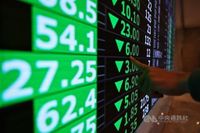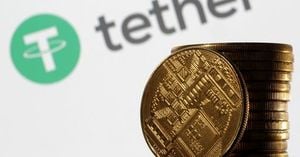Taipei, April 7 (CNA) – Taiwan's stock market experienced unprecedented turmoil on Monday as a wave of panic selling gripped investors, leading to a staggering drop of 2,086 points or more than 9.7 percent. This marked the largest intraday point and percentage loss on record, with the weighted index plunging to a low of 19,212.02. The trading day began with futures locked limit-down, and over 1,000 stocks hitting their daily drop limit, indicating widespread market distress.
Among the heavyweights, Taiwan Semiconductor Manufacturing Company (TSMC), Hon Hai (Foxconn), and MediaTek all reached their limit-down prices almost immediately after the market opened. TSMC's shares fell to NT$848, down 94 TWD from the previous close, reflecting a nearly 10% drop. This decline translates to a significant loss for TSMC, which has seen its share value decrease by NT$312 (26.9 percent) since reaching an all-time high of NT$1,160 on January 7, 2025, resulting in a total market value loss of NT$8.1 trillion (approximately US$243.59 billion).
The crash comes in the wake of U.S. President Donald Trump’s announcement of new tariffs that have raised fears of a global trade war. Following Taiwan's four-day Tomb Sweeping Festival holiday, this was the first trading day since the tariffs were announced, and the market reaction was swift and severe. The tariff hike, which imposes a 32% duty on certain goods, has particularly impacted Taiwan, which has one of the highest trade surpluses with the U.S.
Bitcoin also faced significant pressure on the same day, tumbling 7.8% against the Taiwan dollar, marking a one-month low. This drop mirrored the broader global market meltdown triggered by Trump's tariff announcement. Bitcoin's value fell to 2.55 million TWD, while its price in U.S. dollars decreased to $76,914, reflecting a 7.3% decline over the same period. The cumulative losses in April have resulted in a staggering $110 billion reduction in Bitcoin's market capitalization.
In an effort to stabilize the market, Taiwan's government-run National Stabilisation Fund, which has assets amounting to T$500 billion, indicated it could implement measures to restore confidence. The government had already announced a T$88 billion ($2.65 billion) support package for companies affected by the tariffs. Taiwan's top financial regulator also imposed temporary curbs on short-selling of shares to mitigate potential market turmoil.
Market analysts expressed grave concerns about the impact of the tariffs on Taiwan's economy. Venson Tsai, an analyst at Cathay Futures in Taipei, noted, "The panic selling pressure is very high," indicating a significant crisis of market confidence. The Taiwan Stock Exchange Chairman, Sherman Lin, emphasized the need for investor confidence, stating that while it would be challenging for Taiwan to avoid the market impacts of the tariffs, the exchange would remain flexible in its stabilization measures.
As the trading day progressed, the losses extended beyond Taiwan. The Nikkei Index in Japan dropped more than 2,500 points, while Hong Kong's market fell over 2,000 points. Chinese indexes also witnessed dramatic declines, with the Shanghai Composite Index falling 6% and the Shenzhen market nearly 8% lower. In Saudi Arabia, the stock market experienced its most significant single-day drop in five years, plunging almost 7%, while South Korea's losses exceeded 5%, prompting a halt in programmatic trading.
Goldman Sachs has responded to these developments by downgrading Taiwan to "underweight" in its Asian market allocations, citing the country's high exposure to U.S. exports and sensitivity to market fluctuations. The firm predicts that the chance of a recession could be higher than 50% in a worst-case scenario, considering the ongoing trade tensions.
In light of these events, Taiwan's President Lai Ching-te took to social media to reassure citizens about the government's commitment to economic stability. He stated that Taiwan would increase imports from and investments in the United States, aiming for a zero-tariff regime between the two nations. Lai emphasized that he did not seek retaliatory tariffs, instead advocating for bilateral discussions to ensure Taiwan's competitiveness and prosperity.
As the situation unfolds, the global economic landscape remains precarious, with investors closely monitoring the implications of the U.S. tariffs and the resulting market reactions. The unprecedented drop in Taiwan's stock market serves as a stark reminder of the interconnectedness of global economies and the potential for swift changes in market sentiment.






